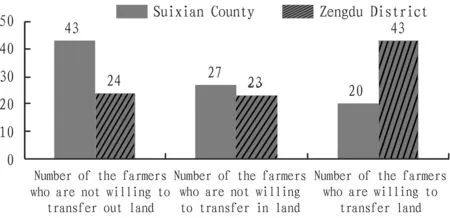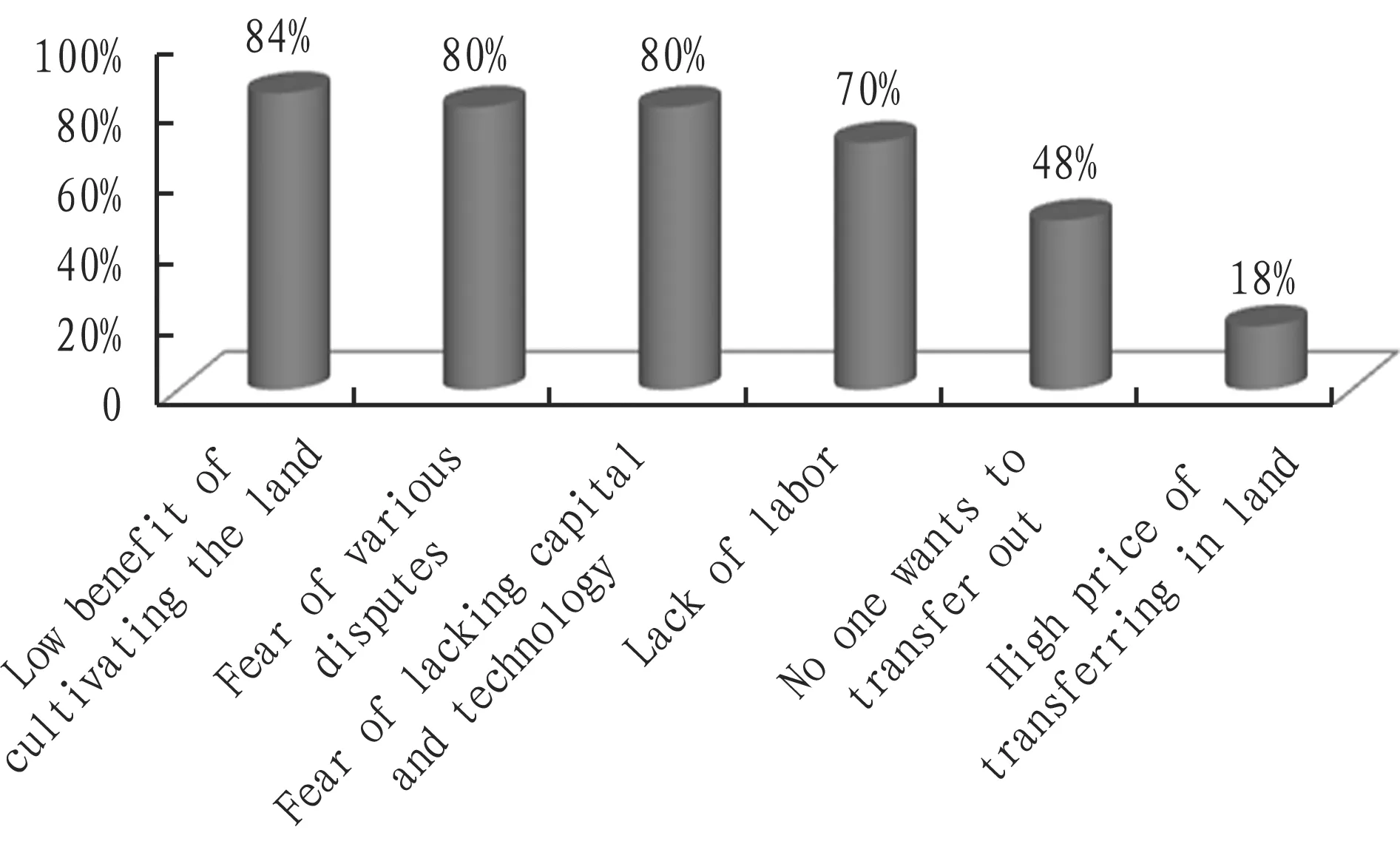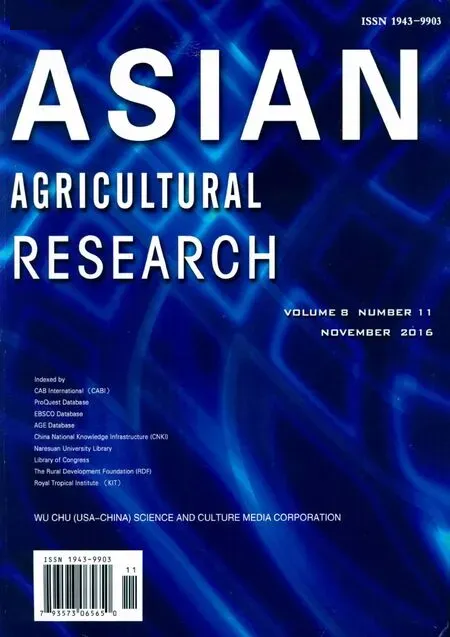A Study of the Factors that Affect Farmers’ Willingness to Transfer Land in the Central Regions Based on a Survey of 180 Farmers in Suizhou City
,
School of Economics, Yangtze University/Hubei Rural Development Research Center, Jingzhou 434023, China
1 Introduction
The rural land transfer is a core issue of agricultural reform. In the fifth meeting of Central Reform Leading Group in 2014, President Xi Jinping pointed out that it was necessary to separate contracting right from management right, and promote the separation of ownership, contracting right and management right, and transfer of management right, under the premise of sticking to collective ownership of rural land. The No. 1 Central Document in 2015 also stressed the need to develop various forms of moderate scale operation. In rural land transfer, we must respect the willingness of farmers, and adhere to the principles of voluntariness and compensation according to the law to transfer land management right. Therefore, farmers’ willingness to transfer land will largely determine the land transfer scale in the region. In December 2015, we made a field survey in Zengdu District and Suixian County, Suizhou City, Hubei Province. From the geographical location and economic conditions, there are some differences between the two places: Zengdu District is on the outskirts of Suizhou, with a high level of economic development, while Suixian County is in the outer suburbs, with low level of economic development. The survey takes the form of questionnaires. Dayuemiao Village and Xiejiawan Village were randomly selected in Suixian County, and Fanchong Village and Xingfu Village were randomly selected in Zengdu District. 50 farmers were randomly selected in each village. A total of 200 questionnaires were sent out, 186 questionnaires were recovered, and there were 180 effective questionnaires (90 for Suixian County and Zengdu District, respectively).
2 Survey statistics
2.1Regionalcharacteristicsandfarmers’willingnesstotransferlandAs is evident from Fig. 1, in Zengdu District with high level of economic development, farmers have strong willingness to transfer land; in Suixian County with low level of economic development, farmers have weak willingness to transfer land, and the farmers who are not willing to transfer out land account for 47.8% of all farmers. This shows that different location and geographical characteristics will have a significant impact on farmers’ transfer willingness. Zengdu District is close to the urban area, and farmers have many non-agricultural employment opportunities, so many farmers choose to work in other industries with higher comparative benefits, and are naturally more willing to transfer land. Relatively speaking, the farmers in Suixian County have less non-farm employment opportunities, and the family income mainly depends on agricultural income, so the farmers are attached to their native land and unwilling to leave it.

Fig.1Farmers’willingnesstotransferland
2.2Individualcharacteristicsandfarmers’willingnesstotransferland
2.2.1Effect of educational level on transfer willingness. From Table 1, it can be found that educational level will have a significant impact on farmers’ willingness to transfer land. Overall, the educational level of respondents is very low, but up to 66.7% of farmers with educational level of senior high school and above are willing to transfer. For the farmers with educational level of primary school and below, the proportion is only 12.5%, and there is a significant positive correlation between transfer willingness and educational level.
Table1Educationallevelandfarmers’willingnesstotransferland

EducationallevelNumberofhouseholdsNumberoffarmerswhoarewillingtotransferlandProportion∥%Primaryschoolandbelow961212.5Juniorhighschool724359.7Seniorhighschoolandabove12866.7Total18063138.9
2.2.2Effect of age on transfer willingness. From Table 2, it is found that the farmers of different ages show different willingness to transfer land. The middle-aged and elderly farmers have low transfer willingness. 26.7% of farmers aged 51-60 are willing to transfer land, only 12.5% of farmers aged over 60 are willing to transfer land, but up to 83.3% of farmers aged below 30 are willing to transfer land. It is inferred that the older the farmers, the weaker the willingness to transfer land, which may be related to the lack of livelihoods of the older farmers and their native complexes.
Table2Thewillingnesstotransferlandforthefarmersofdifferentages

AgeNumberofhouseholdsNumberofpeoplewhoarewillingtotransferlandProportion∥%30121083.330-50742939.251-60862326.7Over608112.5
2.3Familycharacteristicsandfarmers’willingnesstotransferland
2.3.1Effect of family population on transfer willingness. From Table 3, it is found that the larger the family population, the stronger the willingness to transfer land. A large family population means surplus labor, and some of the family members can go out to work to increase the family’s non-agricultural income, which will reduce farmers’ dependence on land so that they are more willing to transfer out land. Large-scale operation on the transferred land needs sufficient labor force, therefore, the farmers with a small family population have relatively weak willingness to transfer in land.
Table3Familypopulationandwillingnesstotransferland

FamilypopulationNumberofhouseholdsNumberofpeoplewhoarewillingtotransferlandProportion∥%2andbelow12216.73-4962930.2Morethan4723244.4
2.3.2Effect of family income on transfer willingness. As shown in Table 4, the annual average income of farmers is very low in the surveyed region, and the lower the per capita income, the smaller the proportion of farmers who are willing to transfer land. For the poor households with per capita annual income of less than 1000 yuan, only 11.5% of them are willing to transfer rural land. The main reason is that these poor families almost take land income as their entire source of life, and they are heavily dependent on land. For the households with relatively high per capita income, they main source of income is non-agricultural channel, so they are more willing to transfer out the idle land.
Table4Relationshipbetweenfamilyincomeandwillingnesstotransferland

FamilypercapitaannualincomeNumberofhouseholdsNumberofpeoplewhoarewillingtotransferlandProportion//%Lessthan1000yuan26311.51000-3500yuan1203831.7Morethan3500yuan342264.7
3 Analysis of reasons for rural willingness to transfer land
3.1ReasonsforunwillingnesstotransferoutlandAs shown in Fig. 2, the three main reasons for unwillingness to transfer out land include fear of losing the security of land (83.6%); fear of losing a stable source of income (77.6%); fear of failing to recover land when they want to do farming (71.6%). On the one hand, this result reflects that farmers lay great stress on land security function; on the other hand, it reflects that farmers are fearful of management right transfer leading to eventual loss of contracting right. The survey shows that up to 80% of farmers know only a little or nothing about national land transfer policy; only 2.7% of farmers are very familiar with policy. This is undoubtedly an important factor that affects farmers’ willingness to transfer land. Generally speaking, the better the understanding of land transfer policy, the more rational the understanding of risk, which will help to improve farmers’ desire to transfer land.
3.2ReasonsforunwillingnesstotransferinlandAs shown in Fig. 3, in the six questionnaire options, the most principal reason for farmers’ unwillingness to transfer in land is that the benefit of cultivating the land is too low, accounting for up to 84%. The three reasons (fear of various disputes after transferring in land; fear of lacking capital and technology; lack of labor) account for 80%, 80% and 70%, respectively. This shows that as economic man, farmers usually consider comparing agricultural benefits with various risks before transferring in land, or comparing their agricultural income with the incomes of migrant workers in the village, in order to make the final choice. As for the fear of disputes after land transfer, the main reason is that it has not yet formed perfect land transfer mechanism in the surveyed region. If the land transfer market is mature and the quality of management and service is high, there will be few land transfer disputes, and low transaction costs in the process of land transfer, which will to a certain extent increase farmers’ willingness to transfer out land[1]. In addition, the survey finds that the farmland is fragmented and scattered in the surveyed region, and even if the farmers transfer in land, it is difficult to implement large-scale operation. The land transfer price is not high, but large-scale agricultural production needs to invest a lot of money at the early stage, and the cash flow rate is low in agricultural production, which brings a lot of financial pressure on the farmers who transfer in land. These are the practical difficulties faced by the farmers who transfer in land.

Fig.2Reasonsforfarmers’unwillingnesstotransferoutland
4 Conclusions and recommendations
4.1ConclusionsBased on the questionnaire survey of land transfer in Suixian County and Zengdu District of Hubei Province, this paper analyzes the factors that affect farmers’ willingness to transfer land from regional characteristics, individual characteristics of farmers, and household characteristics of farmers. The survey results show that farmers’ willingness to transfer land is affected by many factors. And the level of regional economic development, farmer’s age, educational level, family population and income are the important factors influencing farmers’ land transfer. The key factor influencing the willingness to transfer out land is farmers’ high reliance on land security function, and the main reasons for farmers’ land transfer-in lie in low agricultural comparative benefits and immature land transfer market.

Fig.3Reasonsforfarmers’unwillingnesstotransferinland
4.2Recommendations(i) Improving the level of social security in rural areas and reducing farmers’ dependence on land. It is necessary to further improve the rural endowment insurance system, especially the land transfer-related pension system while strengthening the supervision of security funds. According to the land transfer size, farmer’s age and income levels, we can make different levels of old-age insurance, so as to encourage more farmers to voluntarily transfer land out. For the farmers working in city, we can expand the scope of the city’s social security and increase security intensity, to better address their worries. When farmers’ dependence on land is reduced, the transfer willingness will increase. (ii) Bringing the land transfer policies to the public attention and enhancing farmers’ awareness of the policies. It is necessary to strengthen the publicity of agricultural subsidies and land transfer policies for farmers, and deepen farmers’ understanding of land transfer policies, in order to reduce farmers’ unnecessary worries and stimulate their land transfer enthusiasm. We can use the local radio, television and walls to promote the typical cases of getting rich by land transfer, so as to improve the farmers’ willingness to transfer land. (iii) Improving the land transfer mechanism and establishing the land transfer platform. In the process of land transfer, the government should play an important role. Firstly, it is necessary to improve the laws and regulations related to land transfer and regulate land transfer procedures. Secondly, it is necessary to establish land transfer information exchange platform to ensure that the land transfers and transferees keep abreast of the land transfer information through the relevant channels and improve the professionalization and standardization level of land transfer intermediary organizations. Thirdly, it is necessary to establish land transfer intermediary platform to help the land transfers and transferees to transfer land in accordance with the lawful procedures. (iv) Strengthening agricultural productionskill training and improving agricultural labor forces’ skills. We can organize agricultural technical personnel to carry out service in rural areas, enhance rural labor skill training and establish entrepreneurship training base, actively mobilize agricultural vocational schools, training institutions, science and technology volunteers and other social forces to carry out the training on agricultural machinery and equipment operating skills and agricultural management knowledge. There is a need to enhance farmers’ self-confidence, abandon the traditional conservative ideas, and further stimulate farmers’ willingness to transfer land.
[1] XU MY. An empirical study on the farmers wishes about transfer of rural land in developed areas [J]. Journal of Nanjing Agricultural University(Social Science Edition),2014,11(6):97-105. (in Chinese).
[2] QIAN WR, ZHANG ZM. The farmers’ desired scale of land management-An analysis based on a survey in the Middle-Lower Reaches of Yangtze River: An empirical study [J]. Problems of Agricultural Economy,2007, 28(5):28-34. (in Chinese).
[3] ZHAO XQ, LI HJ. An empiricial analysis on the influencing factors of farmers’ land transfer willingness in the western region [J]. Chinese Rural Economy, 2009(8): 70-78. (in Chinese).
[4] QIAO HQ, CHENG WS, XU B. Farmer’s desire characteristics and influence factors of farmland circulation in Hexi corridor [J]. Research of Soil and Water Conservation, 2016(6):209-213. (in Chinese).
 Asian Agricultural Research2016年11期
Asian Agricultural Research2016年11期
- Asian Agricultural Research的其它文章
- Feasibility Analysis of Agricultural Product Price Index Insurance Based on Pilot Cases
- Forecast on Price of Agricultural Futures in China Based on ARIMA Model
- Model Building for Community Participating in Rural Tourism and Game Analysis of Core Stakeholders
- Embedded Programmable Single Point Multiple Output Intelligent Data Acquisition and Transmission System
- Comparative Study of Cotton Plant Height Difference in the Arid Areas Based on LandSat8 OLI Data
- How to Enhance the Brand Competitiveness of Ginseng Enterprises?
